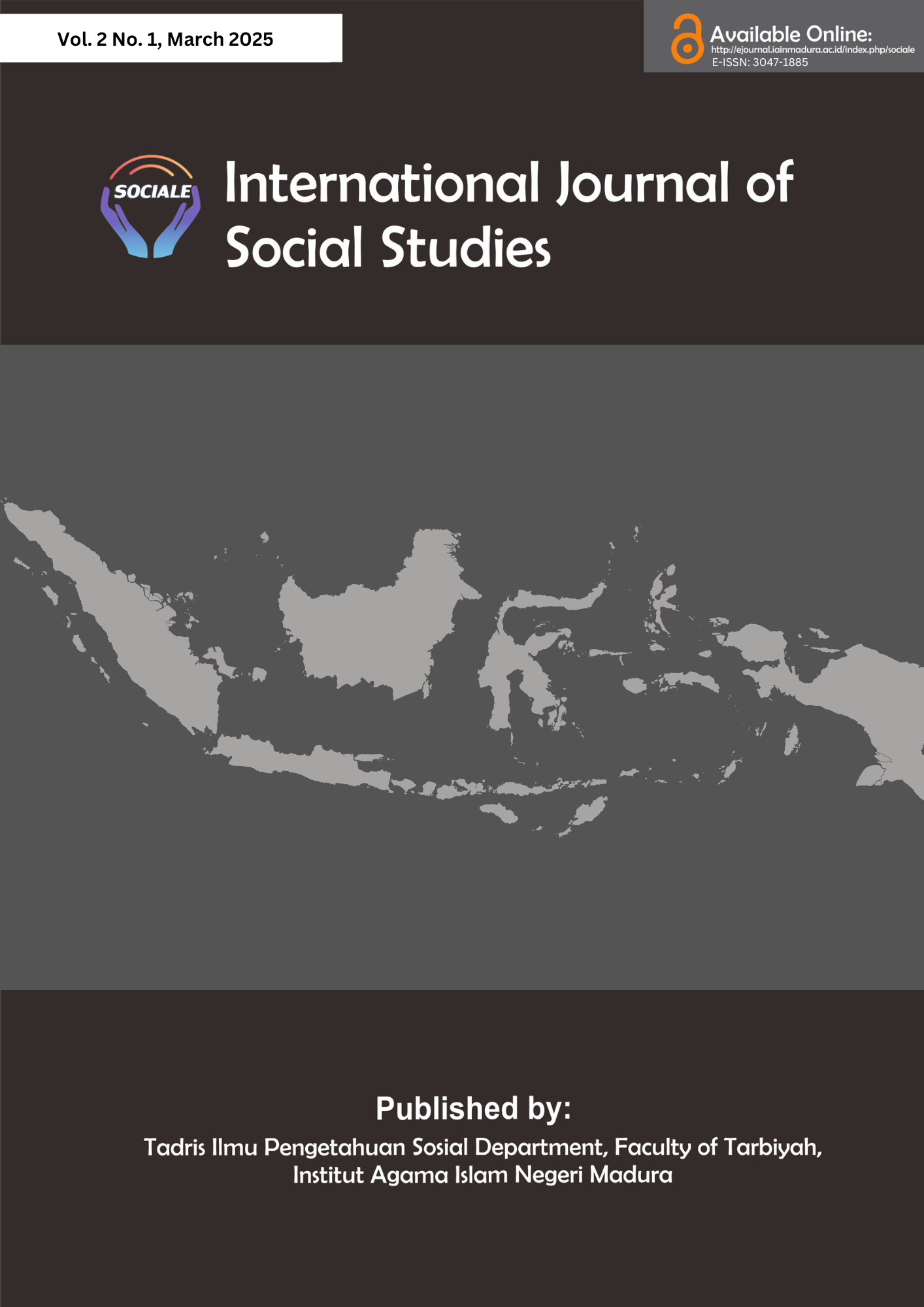The Influence of Quantum Learning Model Implementation on Students Interpersonal Intelligence in Social Studies Class IX at SMP Plus Al Madaniyah Branta Tinggi Pamekasan
 Abstract views: 42
,
Abstract views: 42
,
 PDF downloads: 23
PDF downloads: 23
Abstract
Research in general was carried out to determine the effect of applying the Quantum Learning model on the interpersonal intelligence of class IX students at SMP Plus Al Madaniyah. This research uses quantitative experimental methods, pre-experimental design, one group pretest posttest. The population and sample of this research was class IX of SMP Plus Al Madaniyah Branta Tinggi Pamekasan, totaling 25 students. The object of the research is students' interpersonal intelligence. Data collection techniques use questionnaires, interviews and observation. The data collection instruments used in this research were questionnaire sheets, interview guidelines and observation sheets. The data analysis technique uses quantitative descriptive analysis techniques. The research results showed that the interpersonal intelligence of class IX students at SMP Plus Al Madaniyah before the Quantum Learning learning model was implemented was in the medium category. Based on the pretest-posttest score analysis, it was found that the average score of the experimental class that was treated was higher, namely 69.2 compared to the experimental class before being treated with a score of 63.64. And based on the results of the paired sample T test with the help of SPSS Version 22 for Windows, the pretest posttest results obtained a significance value of 0.009, less than 0.05. This shows that the hypothesis in this research (Ha) is accepted, namely that there is an influence of the application of the Quantum learning learning model on students' interpersonal intelligence and rejection (Ho). From the research results, it can be concluded that the Quantum learning model is able to improve the interpersonal intelligence of class IX students at SMP Plus Al Madaniyah Branta Tinggi Pamekasan and provide a positive influence
Downloads
References
Bobbi DePorter, Mark reardon, sarah singer nourie. (1999). Quantum Teaching : mempraktikkan Quantum learning di ruang-ruang kelas. PT Mizan Pustaka.
Goleman, D. (2004). Emotional Intelligence (Kecerdasan Emosional) Mengapa EI lebih penting dari IQ. In Gramedia pustaka utama.
Hernacki, B. D. and M. (2008). Quantum Learning Membiasakan Belajar Nyaman Dan Menyenangkan. Kaifa.
Hofur. (2021). Konsep Multiple Intelligences Perspektif Al-Quran/ Hadis dan Implikasinya Terhadap Pembelajaran Pendidikan Agama Islam. Tarbawi : Jurnal Pendidikan Islam, 17(2). https://doi.org/10.34001/tarbawi.v17i2.1647
Jannah, B. P. dan L. miftahul. (2016). Metodologi Penelitian Kuantitatif. In PT Rajagrafindo Persada (Vol. 3, Issue 2). IKP. https://www.infodesign.org.br/infodesign/article/view/355%0Ahttp://www.abergo.org.br/revista/index.php/ae/article/view/731%0Ahttp://www.abergo.org.br/revista/index.php/ae/article/view/269%0Ahttp://www.abergo.org.br/revista/index.php/ae/article/view/106
Montolalu, A. A. (2015). PERANAN PEMERINTAH DALAM MEWUJUDKAN PENDIDIKAN WAJIB BELAJAR DI KECAMATAN MATUARI KOTA BITUNG. Jurnal Ilmu Politik, 1.
Putri, Anggi Sasongko, E. C. M. (2023). Pengaruh Metode Bermain Peran Makro Terhadap Kecerdasan Interpersonal Anak Usia 5-6 Tahun. In PAUD teratai (Vol. 12, Issue 1).
Safaria, T. (2005). Interpersonal intelligence : metode pengembangan kecerdasan interpersonal anak. Amara Books.
Sukitman, T. (2004). Konsep Pembelajaran Multiple Intelligence Dalam Pendidikan Ips Di Sekolah Dasar. Jurnal Ilmiah.Fakultas Keguruan Dan Ilmu Pendidikan, 18(1), 1–12. https://media.neliti.com/media/publications/235023-konsep-pembelajaran-multiple-intelligenc-eb07746b.pdf
Teguh, M. (2014). Metode Kuantitatif untuk Analisis Ekonomi dan Bisnis. PT RAJAGRAFINDO PERSADA.










